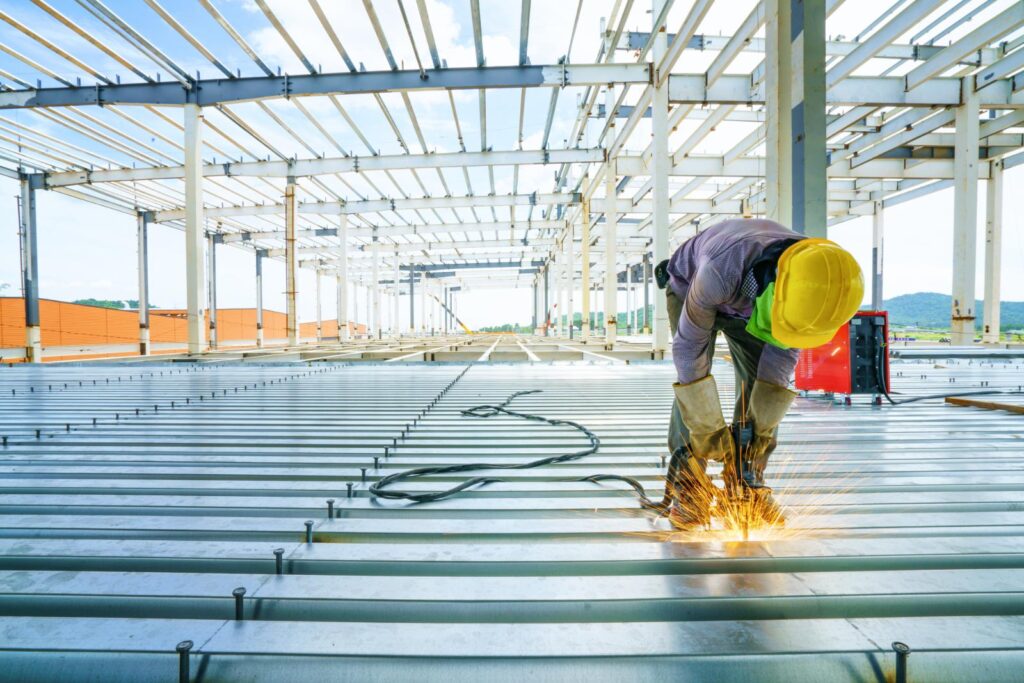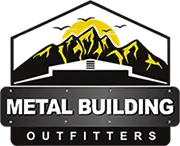
Contents
Choosing the right metal garage isn’t just about aesthetics; it’s about durability and longevity. You need to evaluate various factors to guarantee your investment stands the test of time. From examining your space to understanding local building codes, each decision can greatly impact your garage’s performance. So, what are the essential tips that can guide you in making a well-informed choice?
Key Takeaways
- Select high-quality steel with a gauge between 14 to 12 for optimal durability and weather resistance.
- Ensure the garage design includes storm-resistant features to withstand severe weather conditions.
- Research the manufacturer’s reputation and warranty offerings to guarantee product reliability and customer satisfaction.
- Verify compliance with local building codes and zoning regulations to avoid legal complications.
- Plan for regular maintenance and apply protective coatings to enhance the longevity of the garage.
Assess Your Space Requirements
When considering durable metal garages, you should frequently assess your space requirements to guarantee ideal functionality and efficiency.
Start by measuring the available area where you plan to install the garage. Accurate space dimensions are essential; ensuring you account for any potential obstructions like trees or utility lines will help you avoid future complications.
Next, evaluate your usage requirements. Consider what you’ll be storing or working on in the garage. If you need space for vehicles, tools, or equipment, factor in their sizes to determine the appropriate dimensions of the garage.
Don’t forget to include room for movement and organization; an efficiently laid out garage improves accessibility and enhances your experience.
Think about future needs as well. If you anticipate expanding your collection of vehicles or tools, it might be wise to select a garage that exceeds your current requirements. This foresight can save you time and money down the line.
Additionally, consider local building regulations and zoning laws. These can dictate the maximum allowable dimensions for your structure, so understanding these limitations is essential for compliance and avoiding potential penalties.
Evaluate Material Quality
When evaluating material quality for your metal garage, start by gauging the steel thickness, as it greatly impacts durability and strength.
Additionally, consider the corrosion resistance features, which protect your investment from rust and environmental damage.
Choosing high-quality materials guarantees longevity and reduces maintenance costs over time.
Gauge Steel Thickness
Selecting the right gauge steel thickness is vital for guaranteeing the durability and longevity of your metal garage. When you look at a steel gauge comparison, you’ll notice that a lower gauge number corresponds to a thicker steel. Thicker steel offers significant thickness advantages, such as enhanced strength and resistance to impact, which is essential for protecting your garage’s contents.
For most residential applications, a gauge between 14 and 12 is recommended. A 14-gauge steel provides a good balance between cost and durability, while 12-gauge steel offers superior strength, particularly if you plan to store heavy equipment or vehicles. Choosing a thicker gauge means you’re investing in a garage that can withstand harsh weather conditions and potential damage.
Additionally, consider the applications specific to your needs. If you live in an area prone to high winds or heavy snowfall, opting for a thicker gauge can provide peace of mind.
Ultimately, understanding steel gauge comparisons and the thickness advantages will help you make an informed decision that aligns with your requirements and guarantees the lasting quality of your metal garage.
Corrosion Resistance Features
Along with selecting the appropriate gauge steel thickness, evaluating corrosion resistance features is vital for guaranteeing your metal garage’s longevity. Corrosion can greatly diminish the structural integrity and appearance of your garage, so investing in high-quality materials is essential.
Look for steel that incorporates effective corrosion prevention methods and protective coatings.
When reviewing corrosion resistance, consider the following features:
- Galvanization: This process coats the steel with zinc, providing a barrier against rust and corrosion.
- Polyester or Epoxy Coatings: These protective coatings add an extra layer of defense against moisture and environmental elements.
- Aluminum or Stainless Steel Options: Both materials naturally resist rust, offering long-lasting durability without extensive maintenance.
Make certain to verify the manufacturer’s specifications and warranties regarding corrosion resistance. A reputable supplier should provide detailed information on the protective measures they use.
Consider Design Flexibility
While evaluating options for metal garages, design flexibility plays a crucial role in guaranteeing the structure meets your specific needs. You’ll want to reflect on how versatile the design can be, allowing for changes in function or appearance over time. Embracing current design trends not only enhances the visual appeal but also incorporates functional aesthetics, guaranteeing that your garage remains both useful and attractive.
Here’s a quick overview of factors to reflect on regarding design flexibility:
| Feature | Importance |
|---|---|
| Customizable Layout | Adapt to different storage needs |
| Material Options | Choose finishes that complement your property |
| Size Variability | Accommodate future expansions |
A customizable layout guarantees you can adapt the garage to fit various storage needs, whether you’re housing vehicles, tools, or recreational equipment. Material options allow for finishes that enhance your property’s overall aesthetic, creating a cohesive look. Size variability is crucial if you plan to expand your garage later on for additional vehicles or storage.
Check Local Building Codes
Before you proceed with your metal garage installation, it’s essential to research local zoning regulations.
You’ll need to understand the specific permit requirements and any height restrictions that may apply in your area.
Ensuring compliance with these codes not only avoids legal issues but also guarantees that your garage meets safety standards.
Research Zoning Regulations
Maneuvering the complexities of zoning regulations is crucial when planning to install a durable metal garage. Understanding these regulations can save you time, money, and potential headaches down the road. Zoning classifications dictate what structures are permissible on your property and how they relate to property lines.
Before you proceed, make certain to:
- Verify the zoning classification of your property to confirm a metal garage is allowed.
- Check the required setbacks from property lines, as these can vary considerably.
- Review any local restrictions that may impact the size and height of your garage.
Taking these steps will help you align your garage plans with local regulations, confirming compliance and avoiding potential fines.
It’s a good idea to consult with your local zoning office or a professional to clarify any uncertainties. You want to create a space that not only meets your needs but also respects community standards.
Understand Permit Requirements
Understanding permit requirements is essential when planning to build a durable metal garage. Before you start, you’ll need to familiarize yourself with the various permit types specific to your area.
Most local jurisdictions require a building permit, and some may also mandate electrical or plumbing permits, depending on your garage’s design and intended use.
To navigate the approval process effectively, contact your local building department. They can provide you with detailed information on what permits are needed, the associated fees, and any forms you must complete.
Be prepared to submit plans that meet local building codes, which may include specifications on structural integrity, safety standards, and zoning restrictions.
Check Height Restrictions
Checking height restrictions is vital to guarantee your metal garage complies with local building codes. Before you make a purchase, you should familiarize yourself with the specific regulations in your area. Height measurements can vary greatly depending on your location and zoning laws, so it’s important to do your due diligence.
Here are some key points to keep in mind:
Local zoning regulations – Check for any rules that dictate maximum garage heights.
Neighborhood restrictions – Some communities have additional guidelines that could affect your garage design.
Future needs – Reflect on potential modifications or additions that may require extra garage clearance.
Ensuring your garage meets these standards not only avoids potential fines but also enhances your property’s value. You wouldn’t want to invest in a structure that doesn’t fit within the established limits.
Always consult with your local building authority to get the most accurate information on height restrictions. By being proactive, you’re creating a space that’s both functional and compliant, ensuring that your investment stands the test of time while fitting seamlessly into your community.
Focus on Weather Resistance
When selecting a metal garage, prioritizing weather resistance is vital to secure long-term durability and performance. You need a structure that can withstand the elements, whether it’s heavy rain, snow, or high winds. Look for garages that feature storm-resistant designs, as these will provide additional stability and protection during inclement weather. A robust frame and reinforced walls are key components that contribute to this resilience.
In addition to the structural integrity, the materials used in your garage play an important role in its weather resistance. Opt for metal garages with high-quality weatherproof coatings. These coatings not only protect the metal from rust and corrosion but also enhance the garage’s ability to repel water and resist fading due to UV exposure. This guarantees your garage maintains its appearance and functionality over time.
Furthermore, consider additional features like insulation, which can help regulate temperature and prevent moisture buildup. This is particularly important if you plan to use the garage for storage or as a workspace.
Lastly, always check for warranties that cover weather-related damage. A reputable manufacturer should stand behind their product, assuring that it can withstand various weather conditions.
Look for Customization Options
When choosing a metal garage, consider the importance of customization options, particularly regarding size and layout.
Tailoring the dimensions and configuration can enhance functionality based on your specific needs.
Additionally, explore various features and accessories that can improve usability and increase the overall value of your garage.
Size and Layout
Choosing the right size and layout for your metal garage is essential to maximizing functionality and efficiency. You need to evaluate your specific needs, ensuring the garage dimensions align with your intended use. Proper layout optimization allows you to utilize every square foot effectively.
When planning your garage, keep these factors in mind:
- Intended Use: Are you parking vehicles, creating a workshop, or storing equipment?
- Access Points: Assess door placements and pathways for easy movement.
- Future Expansion: Think about potential growth; will you need more space later?
By evaluating these elements, you can customize the layout to enhance your garage’s usability.
It’s important to visualize how you’ll arrange tools, vehicles, and other items to prevent clutter and maintain organization. This strategic approach not only improves accessibility but also fosters a sense of belonging as you create a dedicated space that feels just right for you.
Ultimately, selecting the appropriate size and layout fosters a garage that meets your needs today and adapts to your future, ensuring you get the most out of your investment.
Features and Accessories
After determining the ideal size and layout for your metal garage, the next step involves exploring features and accessories that enhance its functionality and tailor it to your specific needs.
When considering accessory options, think about how you’ll use the space. For instance, if you’ll be using the garage for vehicle storage, you might want to add insulated doors for climate control or additional shelving for tools and equipment.
Feature enhancements can greatly impact the usability of your garage. Consider installing windows for natural light or ventilation systems to keep the air fresh. If you plan to work on projects inside, adding electrical outlets and lighting fixtures can make a big difference in convenience and safety.
Additionally, don’t overlook security features. Options like reinforced doors, security cameras, and motion-sensor lighting can provide peace of mind.
Customizing your metal garage with these features not only improves its functionality but also guarantees it meets your lifestyle needs. By thoughtfully selecting accessory options and feature enhancements, you create a space that’s not just a garage but a valuable extension of your home.
Research Manufacturer Reputation
Before making a decision on a metal garage, it’s crucial to research the manufacturer’s reputation, as this can greatly impact the quality and longevity of your investment. A well-respected manufacturer not only provides durable products but also guarantees reliable customer service.
You’ll want to dig deep into the brand’s history and understand their market presence.
Here are a few key aspects to keep in mind:
Customer Reviews: Look for feedback from previous buyers. Genuine reviews can give you insights into the durability, functionality, and overall satisfaction of the product.
Brand History: Investigate how long the manufacturer has been in the business. A company with a solid history is often more trustworthy and experienced in producing high-quality metal garages.
Warranty and Support: A reputable manufacturer usually offers an all-encompassing warranty. This assurance indicates confidence in their product and offers you peace of mind.
Compare Prices and Value
When you’re in the market for a metal garage, comparing prices and evaluating value is vital to confirm you’re making a sound investment.
Start with a thorough budget analysis to determine how much you can realistically spend. This will help you filter out options that are either too expensive or below your quality standards.
Conduct a cost comparison among various manufacturers and models. Look not just at the base price but also consider additional features, warranties, and potential long-term savings. For instance, a slightly higher initial investment might offer superior durability and lower maintenance costs over time.
Don’t forget to account for customization options. While some companies charge extra for features like insulation or additional doors, others might include these in their base price. Understanding these nuances can greatly impact your total expenditure.
Make certain to read reviews and gather testimonials from other buyers. Sometimes, a lower price might indicate lesser quality or poor customer service, which can lead to unexpected costs down the line.
A metal garage is a long-term investment, so it’s essential to confirm that you’re not just buying based on price but also evaluating the overall value.
Review Installation Services
Once you’ve compared prices and value, it’s important to evaluate the installation services offered by the manufacturer. The quality of installation can markedly impact the longevity and functionality of your metal garage. You want to guarantee that your investment is protected through professional and reliable service.
When reviewing installation services, consider the following aspects:
Installation Quality: Look for manufacturers who emphasize high installation standards. Check if they provide detailed guidelines or if they guarantee their work.
Service Reviews: Investigate customer feedback regarding the installation process. This can provide insights into how well the team communicates, completes the job, and addresses any issues that arise.
Warranty and Support: Investigate the warranty on installation. A solid warranty indicates a manufacturer’s confidence in their installation services and offers peace of mind for you.
By taking the time to explore these factors, you’ll gather essential information that can help you make an informed decision.
Engaging with others who’ve had similar experiences can also provide clarity. Join forums or social media groups dedicated to metal garages; sharing insights can build a sense of community and belonging.
Ultimately, thorough reviews of installation services will guide you toward a manufacturer that prioritizes your needs and offers exceptional support throughout the installation journey. Your metal garage shouldn’t only meet your expectations but exceed them through superior installation quality.
Plan for Maintenance Needs
Planning for maintenance needs is essential to guaranteeing the longevity and performance of your metal garage. By implementing a structured approach, you can effectively protect your investment and keep your garage in prime condition.
Start by establishing a maintenance schedule that outlines regular inspections and tasks. This schedule should include checks for rust, structural integrity, and sealant effectiveness on doors and windows.
Preventive measures play a key role in safeguarding your garage against potential issues. For example, regularly cleaning the exterior will prevent dirt and grime buildup, which can lead to corrosion over time. Additionally, applying a protective coating can enhance the metal’s resistance to the elements.
Don’t forget to inspect the roof for debris and clear any blockages that could cause water damage.
Documenting your maintenance activities is equally important. It not only helps you stay organized but also provides a record of care that may be beneficial for future buyers.
If you’re not comfortable performing maintenance tasks yourself, consider hiring professionals who specialize in metal structures. This can save you time and guarantee that all work meets industry standards.
Lastly, cultivate a sense of community by discussing maintenance tips with fellow garage owners. Sharing experiences can provide valuable insights and foster a supportive environment for those who appreciate the durability and functionality of metal garages.
Review
When choosing a durable metal garage, you’ve got to weigh all these factors carefully. By evaluating your space, prioritizing quality materials, and considering design flexibility, you guarantee a solid investment. Don’t forget to research manufacturers and check maintenance requirements—how else can you assure your garage stands the test of time? With the right preparation and knowledge, you can create a functional and long-lasting structure that meets your needs for years to come.
Recent Posts
5 Best High-Quality Metal Warehouses for Storage
Think of high-quality metal warehouses as the backbone of your business, providing the strength and
What Are the Benefits of Metal Warehouses?
When considering storage solutions, metal warehouses stand out for their durability and cost-effectiveness. They can
Why Opt for Custom Metal Barn Designs?
Imagine a space that meets your practical needs and reflects your personal style. Custom metal

